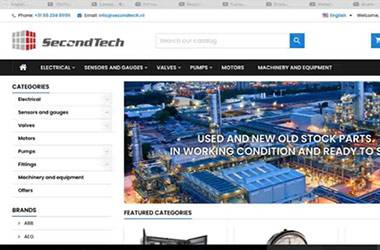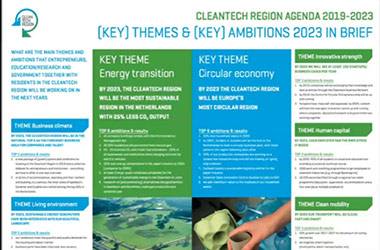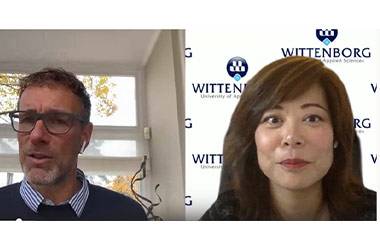Wittenborg Students Address 'Sustainability through Innovation of Circular Business Ideas' in Project Week
Wittenborg Students Address 'Sustainability through Innovation of Circular Business Ideas' in Project Week
Wittenborg Students Address 'Sustainability through Innovation of Circular Business Ideas' in Project Week
https://www.wittenborg.eu/wittenborg-students-address-sustainability-through-innovation-circular-business-ideas-project-week
A Real-Life Project
During the recent Project Week assignment, bachelor's students at Wittenborg were engaged in activities that require them to address the issue of 'Sustainability through Innovation of Circular Business Ideas'. The main aim of this real-life project is to encourage our students to be aware of environmental issues that are plaguing the world today.
Increasing Awareness
In the past hundred years, industrialisation, urbanisation and modernisation have catalysed and accentuated the 'make-use-dispose' business culture all over the world. This rapidly increasing culture has excessively deteriorated the earth's environment and depleted the planet's limited resources. As part of its efforts to increase student and staff awareness of environmental issues, Wittenborg has infused into its curriculum projects revolving around sustainability and the circular economy. The idea is to make students more aware of ongoing social, business and environmental issues and to educate them on what they can do to help the situation.
During the recent Project Week assignment, bachelor's students were tasked to develop innovative business ideas that look beyond the current predominant 'take-make-waste' industry linear models. The students played the role of founders of new startup circular companies and were to come up with entrepreneurial ideas that focus on home-based recycling, or industry-based (such as tourism and hospitality) initiatives. After that, the students were to write a mini business plan that proposes how their clean-tech businesses will develop economically while eliminating waste and re-using resources continually.

'Elevator Pitch' to present ideas
Inspiring ideas on how to increase sharing, refurbishment, re-use, recycling, or manufacturing that creates a closed-loop system, while at the same time reducing the use of resource inputs and carbon emissions and pollutions, were received. The students also had a chance to peer review each other's ideas, an exercise they said was a useful learning experience. The Project Week Representatives also got an opportunity to visit Second Tech, a circular enterprise with expertise in electrical processes, and environmental technologies, industrial automation, business automation, and sales.
The different teams were also required to record an 'elevator pitch', which will be evaluated by external partners. The winners of the elevator pitch will be announced at a later date and prizes will be awarded to the winning team/s. For those who are unfamiliar with 'elevator pitch', it is actually a brief, pre-prepared, persuasive speech that explains what your organisation does, or what your idea is, in a clear and succinct manner. The reason why it is called 'elevator pitch' is because it should be short enough (but full of information) to present to your person of interest (CEO or potential business partner/client) during an elevator ride. It is used as a way to share your expertise, credentials, ideas or opinions, quickly and effectively with people you don't know but have an interest in.

Circular Economy Model for Sustainability
During the kick-off session, Wittenborg's CEO, Maggie Feng, expounded on how companies implement a circular economy model to facilitate sustainability. She explained how circular companies such as Clean Tech Regio are working together with entrepreneurs, educational institutions, and research agencies on energy neutral sustainable economy. They also work with the community in the municipalities of Apeldoorn, Bruman, Deventer, Epe, Heerde, Lochem, Voorst, and Zutphen. Maggie said that Wittenborg is working together with Clean-Tech Regio towards the achievement of a circular economy. She stated that "…. the role of Wittenborg is participating in Clean Tech Regio Tables Strategic Board Stendendriehoek. This is a kind of a task force, in which we are participating in profiling and promotion as well as in human capital, and together we are trying to make this region the most circular region in Europe to support Clean Tech Regio as leaders of change…"
Other partner companies
Other circular companies included in the discussion during the Project Week were:
- Join The Pipe, who are championing reusable water bottles to reduce the amount of plastic waste produced.
- Too Good To Go, a circular company that has developed an App that allows users to order surplus food from the local store.
- Plastic Whale, a circular company aiming at plastic-free waters by collecting plastic wastes from water bodies and creating products from the waste, conducting education programmes on how to have plastic-free water bodies.
Experts in circular economy interviewed to assist the students in this "real-life" project week included Arko van Brakel, the director of CleanTech Region, and Manfred Kugel, co-founder of SecondTech.nl.
WUP 17/11/2020
by Hanna Abdelwahab and Emmah Muchoki
©WUAS Press
767 words